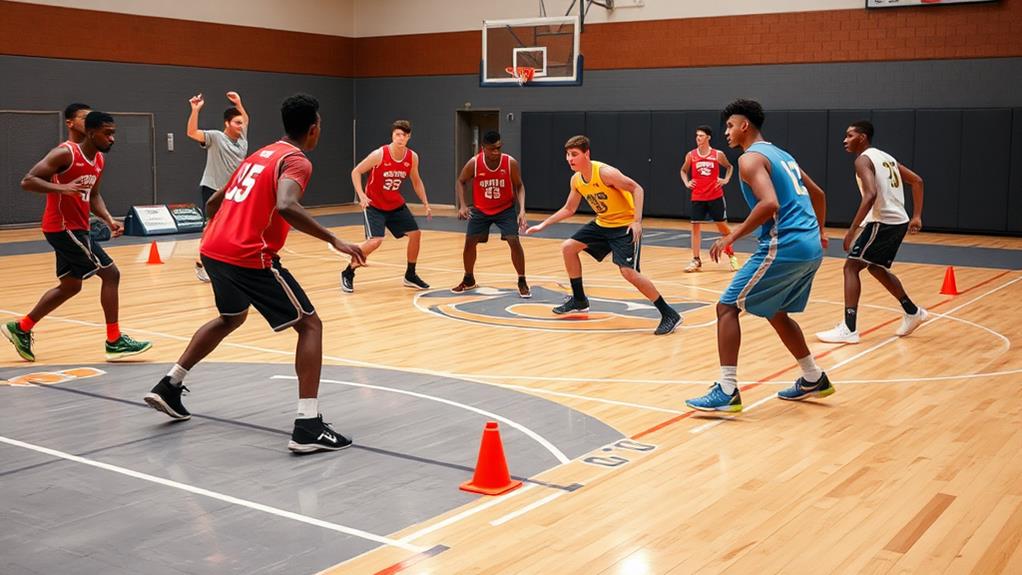
Top Basketball Defense Drills for Players of All Levels
November 10, 2024To boost your basketball defense, focus on key drills tailored for all skill levels. Start with the Closeout Drill to contest shots effectively, followed by the Defensive Slide Drill to enhance your lateral movement. Incorporate the Shell Drill to improve teamwork and communication. The 1-on-1 Defense Drill sharpens your anticipation and response to offensive actions. Practice full court defense with drills that simulate fast breaks, ensuring you're ready for real-game pressure. Remember, a strong defense not only builds confidence but also limits opponent scoring opportunities. If you want to discover even more drills and strategies, keep exploring!
Overview of Defensive Drills
Defensive drills serve as the backbone of your basketball training, focusing on critical skills like footwork, positioning, and anticipation. Mastering these defensive fundamentals is essential for becoming a formidable defender. High-intensity drills not only sharpen your defensive skills but also enhance your cardiovascular fitness, endurance, and stamina, allowing you to maintain defensive intensity throughout the game.
By understanding the importance of winning strategies in global basketball, you can further improve your defensive approach during competitions.
Key drills, such as the Closeout Drill and Defensive Slide Drill, emphasize specific defensive techniques. These drills help you contest shots effectively while improving lateral movement, balance, and control. By practicing these techniques regularly, you'll become a more agile and effective defender.
Incorporating team-oriented drills, like the Shell Drill, fosters essential communication and teamwork. These aspects are significant for executing cohesive team defense during gameplay. When you work together with your teammates, you'll develop a stronger understanding of defensive rotations and responsibilities.
Regular practice of defensive drills several times a week allows you to track your progress through metrics like defensive stops, steals, blocks, and rebounds. This ongoing evaluation helps you refine your skills and adapt your defensive strategies for maximum effectiveness on the court.
Importance of Defensive Skills
Defensive skills are essential for your team's success, as they directly limit the scoring opportunities of opponents. When you master these skills, it not only reduces points against your team but also boosts your confidence and understanding of the game.
By focusing on building a strong defense, you contribute to a more cohesive unit on the court. Additionally, strong defensive principles can enhance your overall gameplay, making you a more valuable player.
Enhances Team Success
While many fans focus on scoring prowess, the truth is that solid defensive skills are essential for a team's success on the basketball court. When you prioritize defense, you not only limit your opponents' scoring opportunities but also create a foundation for your team's victory.
Emphasizing defensive drills can notably elevate your team's performance in multiple ways:
- Increased Turnovers: A well-executed defense leads to more turnovers, allowing your team to capitalize on fast breaks and score efficiently.
- Enhanced Communication: Strong defensive skills foster better communication among players, which is critical for cohesive team play.
- Mental Toughness: Engaging in defensive drills builds resilience, preparing players to handle high-pressure situations during pivotal moments of the game.
Investing time in honing these defensive skills is key to your team's championship aspirations.
Studies show that teams with robust defensive metrics consistently achieve higher win percentages. By focusing on defense, you're not just strengthening individual players; you're enhancing the overall synergy of the team, making every member more effective on the court.
Reduces Opponent Scoring
A strong defense not only enhances team coordination but also plays a vital role in reducing opponent scoring opportunities. Effective defensive skills are essential for limiting scoring chances by forcing opponents into tough shots, which can lead to turnovers.
When you practice Basketball Defense Drills, focus on maintaining a solid defensive stance and quick footwork. This keeps you agile and better positioned to contest shots, making it harder for opponents to penetrate and score.
To maximize your impact as a defensive player, you must communicate effectively with your teammates. This teamwork leads to improved defensive rotations and help-side coverage, fundamental elements in minimizing scoring chances.
Remember, every defensive stop you make contributes to your team's success. By honing your anticipation and quick reaction skills through drills, you'll greatly disrupt offensive plays and increase your overall athleticism.
Strong defensive skills not only limit the opponent's scoring but also create a ripple effect, enhancing both individual and team performance on the court. A solid defense can be the difference between winning and losing, so invest time in developing these essential skills.
Builds Player Confidence
Building player confidence is essential in basketball, and mastering defensive skills plays a significant role in that development.
When you focus on becoming a good defender, you not only improve your game but also enhance your confidence on the court.
Here are three ways defensive skills build that confidence:
- Skill Development: Learning proper footwork and positioning helps you anticipate offensive moves, making you feel more in control during games.
- Team Dynamics: Regular practice of defensive drills fosters communication and teamwork, creating a sense of belonging that boosts your confidence within the team.
- Impact on Performance: Excelling at defense can lead to turnovers and stopped scoring opportunities, elevating your reputation and making you feel valued as a player.
Individual Defensive Skills Drills
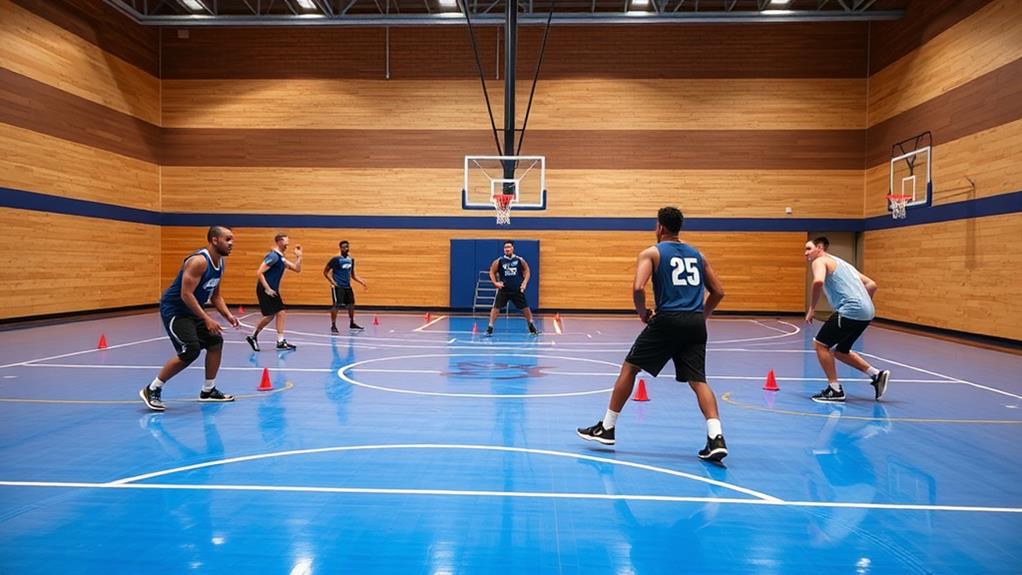
Mastering individual defensive skills is essential for enhancing your overall performance on the basketball court. As defensive strategies evolve in response to offensive tactics, focusing on individual drills becomes even more critical for adjusting to modern gameplay.
Start with the 1-on-1 Defense Drill, which helps you maintain a low and balanced stance. This drill improves your ability to anticipate and react to offensive moves, making you a more formidable defender against historical shifts in defensive approaches.
Next, focus on the Defensive Stance Drill. Here, you'll work on your foot positioning and maintaining a low center of gravity. This drill emphasizes lateral movement, allowing you to react quickly and effectively against your opponent's advances.
The Closeout Drill is another key component. It trains you to sprint from the restricted area to contest shots effectively on the perimeter. You'll learn to shift from big steps to small steps, improving your closing technique while keeping your hands high to contest shots.
Team Defensive Strategies Drills
In team defensive strategies, communication and coordination are key to shutting down your opponent.
Effective mastery of fundamentals can greatly enhance the team's defensive performance, ensuring that every player knows their role and supports one another.
Communication and Coordination
Effective communication is essential for executing team defensive strategies in basketball. It enhances coordination, allowing you and your teammates to anticipate offensive movements and react more efficiently.
To foster effective communication, consider the following strategies:
- Use concise language: Phrases like "Elbow help" or "Baseline help" promote quick decision-making and clarity during critical game situations.
- Implement the Shell Drill: This drill requires defenders to call out switches and help coverage, reinforcing teamwork and spatial awareness on the court.
- Encourage verbal and non-verbal cues: Consistent practice of defensive concepts emphasizes the importance of cues, improving your ability to adapt to changing plays.
Incorporating a scoring system for defensive stops during drills can further motivate players to communicate. When you realize your collective effort directly impacts success, it fosters a culture of accountability.
Remember, strong communication isn't just about talking; it's about understanding your role as a help defender and working together as a cohesive unit.
Help Defense Techniques
Strong communication and coordination set the foundation for successful help defense techniques. You need to position yourself to support your teammates, ensuring that defensive assignments are covered and preventing offensive players from exploiting mismatches.
Effective help defense relies on clear communication; use concise phrases like "help" or "switch" to alert your teammates of impending assistance or changes in assignments.
Anticipating the offensive player's movements is essential. Stay aware of your teammates' positioning and be ready to rotate quickly to cover any gaps in the defense. Maintaining a proper stance is important; stay low and balanced to remain agile enough to react to multiple offensive threats at once during help situations.
One of the best ways to practice help defense is through the Shell Drill. This drill simulates game scenarios, allowing you to learn proper positioning, rotations, and recovery techniques in a team context.
Full Court and Transition Defense
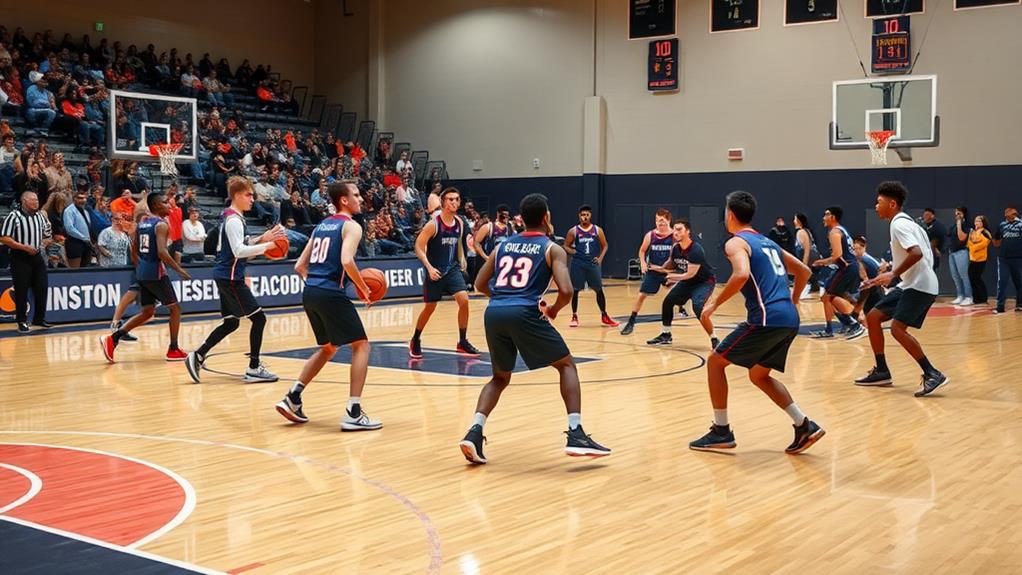
Mastering full court and changeover defense is essential for any basketball team looking to excel. These aspects of defense not only enhance your defensive skills but also prepare you for dynamic game situations.
Racial integration in sports has showcased the importance of teamwork and communication, which are crucial in executing effective defense strategies. Here are three key focuses for effective full court and changeover defense:
- Quick Decision-Making: You need to swiftly identify your opponents during fast breaks. This quick recognition allows you to mark your man effectively and prevent easy baskets.
- Communication: Always communicate with your teammates. Alert them of offensive threats and your current assignments. Clear communication helps maintain team structure during chaotic changeover plays, reflecting the unity and teamwork seen in integrated sports.
- Hustle: When changing from offense to defense, sprint back to your assignments. Your hustle can often be the difference between a made basket and a defensive stop.
Incorporating live play into your changeover defense drills simulates real-game experiences, allowing you to practice adapting under pressure.
Focus on these areas, and you'll see improvements in your team's ability to handle full court scenarios and changeover defense challenges.
Advanced Defensive Drills
Advanced defensive drills are essential for elevating your team's performance on the court. One key drill is the Defensive Shift Drill, which teaches you to sprint back on defense, quickly identifying offensive players you'll be guarding. This skill is vital for halting fast breaks and mirrors the importance of speed and agility training seen in soccer.
Next, the Defensive Footwork Drill with Reaction enhances your agility and defensive footwork. You'll zigzag shuffle while responding to random direction changes, keeping you low and ready to react.
The Defensive Specialist Drill focuses on movements around cones, simulating defensive actions without involving offense. This builds your physical readiness and reinforces the fundamentals of being a strong defender.
Lastly, the 4 on 3 Overload Drill emphasizes effective communication and rotation under pressure. You start with a stationary offense and progress to include dribble penetration, honing your defensive instincts.
Continuous practice of these advanced drills will greatly improve your performance in real-game situations. They address the complexities of defensive gameplay and help you adapt strategically, ensuring you're prepared to challenge your opponents effectively.
Coaching Philosophy and Communication
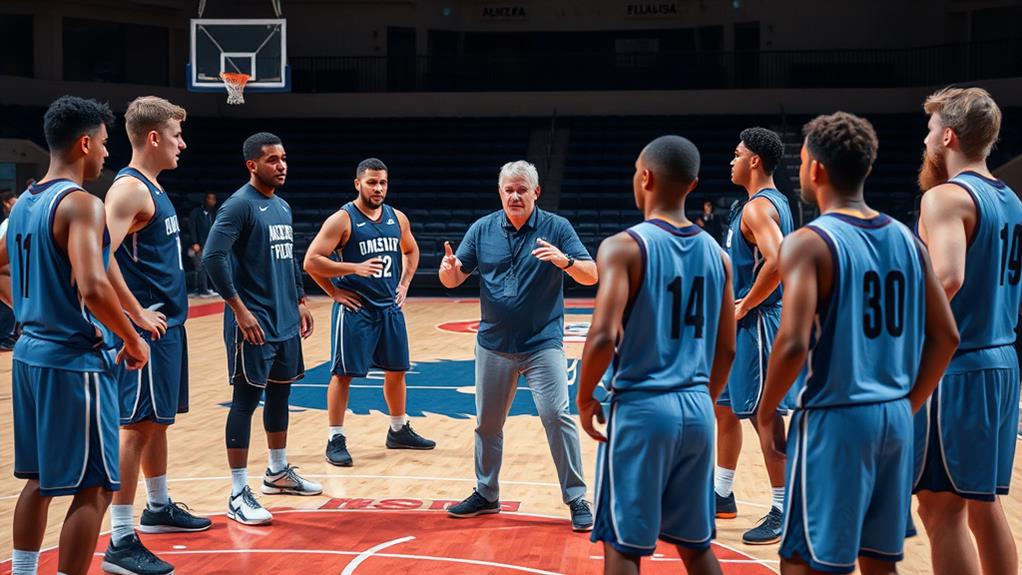
To maximize the effectiveness of defensive drills, a solid coaching philosophy is fundamental. Your approach should focus on preparation and creating opportunities for players to succeed, fostering a positive learning environment. Effective communication is key in this process, similar to how adherence to field dimensions and equipment requirements is essential in soccer.
Here are three essential components to take into account:
- Constructive Feedback: Prioritize constructive over critical feedback. This way, players can learn from their mistakes during defensive drills without feeling discouraged.
- Clear Expectations: Communicate acceptable behaviors and expectations clearly. Make certain players understand their roles in both offensive and defensive plays, which is critical for effective execution.
- Concise Defensive Language: Develop a specific defensive language that enhances team coordination. Using distinct phrases allows for quicker decision-making, especially under pressure.
Incorporating humor into your coaching can also strengthen the player-coach relationship and create a more enjoyable atmosphere. This promotes overall engagement, making your defensive drills more effective and enjoyable for everyone involved.
Key Defensive Techniques
Effective basketball defense relies heavily on key techniques that can make or break a game. First, focus on your footwork. Proper foot positioning and lateral movement help you maintain a low center of gravity, enhancing your agility and quickness during defensive plays.
Importantly, this emphasis on footwork and defensive techniques echoes the pioneering efforts of influential figures like Nera White, who set a high standard for performance on the court.
Next, practice your closeouts. When a shooter gets the ball, sprint towards them with high hands to contest their shot while keeping your balance. This considerably reduces their scoring chances.
Anticipation is another crucial skill. Work on reading offensive players' movements so you can react quickly, allowing for potential steals and disrupted plays.
Positioning is equally fundamental; always stay between your opponent and the basket. This minimizes their scoring opportunities and reinforces effective help-side defense.
Lastly, don't underestimate the power of communication. Clear dialogue among the defensive team is essential for executing strategies. It guarantees everyone knows their roles, responsibilities, and necessary rotations during gameplay.
Resources for Further Development
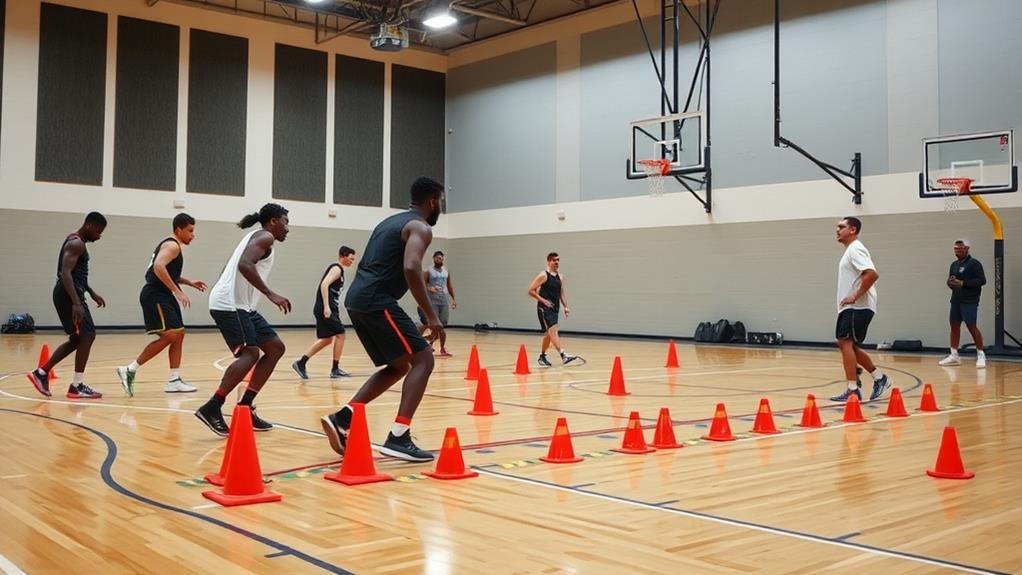
How can you take your defensive skills to the next level? There are numerous resources available that can elevate your training and understanding of defensive strategies. Incorporating dynamic exercises into your warm-up can enhance your agility and readiness on the court.
Here's how to enhance your skills:
- Free PDFs: Utilize online resources that offer free PDFs filled with additional drills and strategies specifically focused on defensive development. These documents can deepen your understanding of key concepts.
- Coaching eBooks: Explore extensive coaching eBooks that provide detailed explanations of various defensive drills and techniques tailored for players of all levels. These texts can be a valuable addition to your training library.
- Video Tutorials: Engage with online video tutorials that demonstrate proper execution of key defensive drills. Visual learning aids in better retention of techniques and helps you grasp the nuances of defensive play.
Additionally, consider attending local basketball clinics or workshops for hands-on experience.
Joining basketball forums or communities can also connect you with fellow players and coaches who share invaluable insights, tips, and resources related to defensive training.
Embrace these tools, and you'll see your defensive skills soar!
Conclusion
In the game of basketball, defense is your shield, protecting the integrity of your team. By mastering these drills, you're not just honing skills; you're building a fortress around your basket. Each practice is a brick laid in the foundation of your defensive prowess, solidifying your readiness to face any opponent. Embrace these techniques, communicate with your teammates, and watch as your collective effort transforms into an unbreakable wall, capable of withstanding the fiercest attacks on the court.


